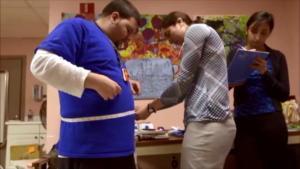A Conversation With Brian Armour About Disability Prevalence Among Healthy Weight, Overweight, and Obese Adults

Brian Armour, PhD is an economist with the Centers for Disease Control and Prevention (CDC). He has spent over 15 years in health services research, including work on helping design the CDC Disability and Health Data System. We asked Brian to discuss findings from the study he led, entitled “Estimating Disability Prevalence Among Adults by Body Mass Index: 2003–2009 National Health Interview Survey” (Armour BS, Courtney-Long E, Campbell VA, Wethington HR. Prev Chronic Dis. 2012; 9: E178. Published online 2012 December 27).
In your article, you assess the number of people who are obese, overweight, or healthy weight and who report having a disability. Why do you think it is important to look at whether people who have weight issues also have disabilities?
This information can help public health programs better recognize the need to design obesity prevention and treatment programs that are inclusive of people with disabilities.
What did you find out?
We found that 41 percent of US adults who are obese also reported having a disability. We also found out that mobility limitation was one of the most frequently reported types of disability among people who are obese.
What does this mean for public health programs?
Public health programs should be considering the needs of those with disabilities when designing their obesity prevention and treatment programs. There are many resources public health organizations can use to help make sure that they are thinking of the needs of people with disabilities. Two good resources include the “Disability Inclusion” section on the CDC’s website as well as the Inclusive Community Health Implementation Package (iChip) program run by the National Center on Health and Physical Activity for People with Disabilities (NCHPAD).
Do you have any recommendations for people with disabilities on how to maintain their weight and avoid becoming obese?
Everyone is different, but it is important that we all are physically active, eat better, and talk to a doctor when not feeling well! People who need help keeping a healthy weight can check out the “Healthy Weight” section of the CDC website for tools to use to help maintain a healthy weight.
Is there anything else you would like to add?
Identifying health issues that people with disabilities experience is important, but we also need to help improve the health of people with disabilities by promoting inclusion. This means making sure that people with disabilities are included in all aspects of community life—in our gyms, healthy eating programs, walking paths, transportation and more.








